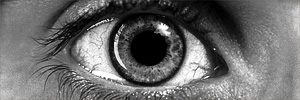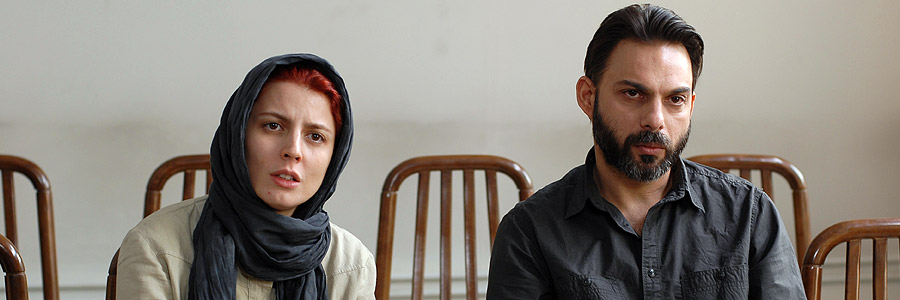
A Separation

A SEPARATION (DVD)
Artificial Eye
Release date: March 16th, 2011
Certificate: 15
Running time: 123 minutes
Country of origin: Iran
Original language: Persian with English subtitles
Writer and director: Asghar Farhadi
Cast: Payman Moadi, Leila Hatami, Sareh Bayat, Shahab Hosseini, Sarina Farhadi, Ali-Asghar Shahbazi
The line between right and wrong is always blurred. It changes from person to person, their personal moral compass defined by age and experience, set strong by religious beliefs, or following the law to the letter. What we feel to be right and wrong can change on who is involved, whether we’re more lenient when it comes to family and friends, or more callous when it comes to someone whom we deem to be a ‘bad person’.
With A Separation, Farhadi presents us with complicated situations, and asks us how we feel, whether anything can really be clear cut into right and wrong, and when it comes to human nature whether anything be boiled down to good and bad.
Nader (Payman Moadi) and Simin (Leila Hatami) are separating. Simin would like a divorce so she can leave Pakistan with her daughter Termeh (Farhadi). Nader refuses to leave his father (Ali-Asghar Shahbazi) who is suffering from Alzheimer’s and needs constant care. Simin cannot live without her daughter, but needs Nader’s permission to take her out of the country. Deadlocked, they argue in front of the exasperated judge, who tells them that their problem is a small one, and there’s nothing he can do.
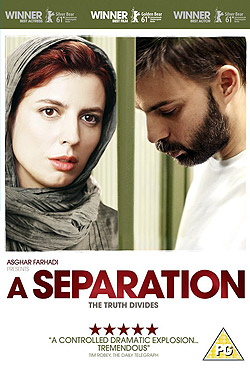
With their visas on the verge of expiration, Simin moves into her mother’s house, leaving Nader to find someone else to care for his ailing father whilst he is at work. Nader hires Razieh (Sareh Bayat), out of her depth but in desperate need of money. She struggles with the daunting task on top of her own problems.
One afternoon Nader and Termeh return from school to find their apartment locked, Razieh and her daughter gone, and his father fallen from his bed, his arm tied to it, locked alone in his room.
Upon Razieh’s return, an argument ensues, she is accused of theft, and the fight gets physical as Nader pushes her out of his apartment. Later that evening, Razieh suffers a miscarriage, claiming that Nader pushed her and she fell down the stairs.
The case is taken to court, where Nader is accused of the murder of Razieh’s unborn child on the claim that his physical act caused the miscarriage. Nader accuses Razieh of theft, and negligence of his father. Razieh’s hot-tempered husband Hojjat (Shahab Hosseini) accuses and insults them both, whilst Simin tries to sort things out as quickly and amicably as possible so she can take her daughter and leave the country.
In the situation, everyone is implicated somehow. The blame shifts from one person to the next, as we’re invited to pass our own judgement on Nader, Razieh, Hojjat and the actions that led to the case. Farhadi presents us with facts, with red herrings and detours, and asks us “what is the truth?” He asks us whether we feel two wrongs can still make a right, or whether we think that any possible right has been buried under so many wrongs.
Throughout the case, Farhadi peels away the layers and the lies that have been told and asks us what we would do protect ourselves from jail, to protect our families from shame. When it comes to ourselves and our families, it’s human nature to be protective. It’s instinctual to side with those we feel closest to and to do what we can to lessen their pain, even if it’s not what we believe to be right.
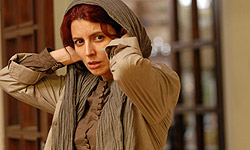
This is exemplified with Termeh, who at aged 11 has a rigid notion of the truth. Early on in the film, Nader says to her, “What’s wrong is wrong, no matter who says it.” Later on, he warns his upstairs neighbour that the police will be over to investigate the fall, telling her to “beware”. Termeh asks, “If she is to tell the truth, what does she have to beware?”
Of course Nader wants his neighbour on his side, he is protecting himself from jail, from paying a huge amount of blood money, from the shame of admitted responsibility for causing a miscarriage, but Termeh can’t get past the fact that he may be lying. This foreshadows the scene where she stands in front of the judge and is asked whether her father really knew that Razieh was pregnant or not. The situation rocks her personally on a massive scale, as she realises that it isn’t always for the best to tell the truth, and that sometimes a lie can be for the greater good of someone she loves. Her motivation is no longer an innocent view of right-or-wrong, but a more adult view of whether her father’s freedom could hinge on the answer she chooses to utter.
The plot unfolds gradually over the course of the film, the pacing is kept taut and it remains extremely engaging over it’s 123 minutes. The more we’re told the more complex the story becomes, the more the characters reveal about themselves, the murkier our feelings towards them become. Facts are fudged, allegiances are made and betrayed.
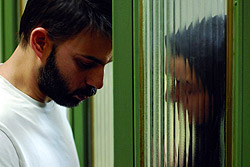
Farhadi gives us a truthful film about how difficult it can be to be truthful. The characters are honest portrayals of people, showing their strengths and weaknesses, and accurately shows that we’re all a mess on the inside. It gives an insight into our motivation and instinct, and it really made me think about how I would act in a similar situation. Farhadi doesn’t judge his characters, leaving it up to us to find our own position. A Separation is as thought provoking as it is morally challenging; it’s a film that will stay with me for a long time afterward.
The cast all gave very strong performances, utterly convincing as conflicted, imperfect people. I could sympathise even as I disapproved, and I found myself moving to each of their shoes as the narrative unfolded. Every performance seems naturalistic, the relationships unbalanced, the performances nuanced with attention to detail, and I felt as though a curtain was being lifted on a society that I’ve never really seen before, providing me with a peek into a world behind the political headlines on the news. These were real people living real lives, and it really translated through the screen.
The final scene is static and long, as Simin and Nader wait in the courthouse corridor. There is no music, just the talking and shouting from the other attendees, footsteps and the banging of doors.
For all the otherness in the Iranian legal system, and society at large, the characters are dealing with the same problems that we do; growing up, growing old, growing apart. And just like them, we’re waiting for the answers that never come easily.

Frances Taylor
Frances likes words and pictures, regardless of media. She finds great comfort and escape in film, and is attracted to anything character-driven with a strong story. Through these stories, she will find meaning in the world. Three movies that Frances thinks are really good for this are You and Me and Everyone We Know (Miranda July), I’m A Cyborg, But That’s OK (Chan-Wook Park), and How I Ended This Summer (Alexei Popogrebsky).
When Frances grows up, she would like to write words and make pictures and have cool people recognise her on the street and tell her that they really enjoy her work.
She can be found overreacting and over-caffeinated on Twitter @penny_face, a childhood moniker from her grandmother owing to her gloriously round face.
© 2012 STATIC MASS EMPORIUM . All Rights Reserved. Powered by METATEMPUS | creative.timeless.personal. | DISCLAIMER, TERMS & CONDITIONS
HOME | ABOUT | CONTACT | TWITTER | GOOGLE+ | FACEBOOK | TUMBLR | YOUTUBE | RSS FEED
CINEMA REVIEWS | BLU-RAY & DVD | THE EMPORIUM | DOCUMENTARIES | WORLD CINEMA | CULT MOVIES | INDIAN CINEMA | EARLY CINEMA
MOVIE CLASSICS | DECONSTRUCTING CINEMA | SOUNDTRACKS | INTERVIEWS | THE DIRECTOR’S CHAIR | JAPANESE CINEMA

 Please wait...
Please wait...